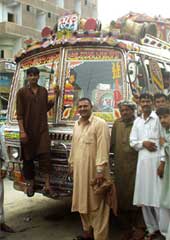Remnants of Empire — Pakistan (2009)
What is Pakistan like 60 years after the British left?

Takeaways
- Pakistan's schools and universities are shut down for an indefinite time because of the latest suicide bombers.
- Past immigration, there is a sign to the CIP lounge. This is not a typo. It stands for "Commercially Important People".
- Punjab (Land of Five Rivers) is also the Land of Cousins. Over half the brides marry their first cousins.
- Punjabis go through life bearing enormous invisible family trees.
Jet-lagged travelers going through immigration at Islamabad’s airport are greeted by a trendy poster:
VISION: to provide a world class immigration service
MISSION: to curb illegal travel through a professional and transparent process / to fairly and expeditiously facilitate passengers to reduced travelers’ anxiety
CORE VALUES: integrity, competence, efficiency, courtesy
Past immigration, there is a sign to the CIP lounge. This is not a typo. It stands for “Commercially Important People.”
Only a distant sound of urban traffic reaches the walled enclave of Aitchison College in Lahore — the cricket fields, parks, magnificent sunset-colored buildings, all manner of birds chirping, innumerable cats — a city within the city.
Tiny tots are introduced to one of the 72 riding horses. Others work on their applications to Princeton, Yale and Harvard.
From the 1870s onwards, the British set up lavish schools such as Rajkumar College at Rajkot and Rajpur, Mayo College at Ajmer, Aitchison College at Lahore and Daly College at Indore. These assured a supply of loyal followers.
Punjab (Land of Five Rivers) is also the Land of Cousins. Over half the brides marry their first cousins. When second cousins are added, the total is around 70%.
At a garden party, one hears drifting by, “…her aunt is x’s second cousin…” and similar dynastic triangulations. Indeed, I believe that Punjabis go through life bearing enormous invisible family trees.
I am having breakfast at the Principal’s lodge. “Selice, Sir?” Remembering Kipling’s “Kim” and his lama referring to the “terain” (train), I gather eventually that “selice” means a slice, i.e., toast.
By sign language, I try to convey that I only want a pot of tea, no more. He rushes off, reappears, beaming, bearing a slice of toast. I repeat. He dashes off again, returns with another slice. I feel like Walt Disney’s Sorcerer’s Apprentice.
Some 2,000 boys are taught there. They come from all over the country, many from distant villages. The screening system is fierce.
A mother was informed that her son was too old for admission by a few months. Undeterred, she returned a few days later with a new birth certificate. A school official said, “Here we have twice-born children applying.”
But now the College is deserted. Boarders were sent home, sometimes on long bus journeys — some to Karachi, some to Quetta, unable to take their exams. Pakistan’s schools and universities are shut down for an indefinite time because of the latest suicide bombers that hit the cafeteria of Islamabad’s International Islamic University. Roadblocks are all over Lahore. Scared-looking policemen are searching some cars, others not.
The proliferation of TV channels is not helpful. Right-wing talk show hosts are spreading denial. Taliban killings, they say, are the works of America, India and Israel.
Top political leaders are nowhere in sight. Not one of them bothered to comfort survivors of terrorist attacks.
Life goes on, a crazy-quilt of everyday routine and high anxiety. The Nation: “Police have put barbed wires in front of all the government installations.” The Daily Times: “Elvis hair sells for $18,300 at auction.”
A massive number of duplicate SIM cards were issued in the names of mobile phone users, surely a boon to terrorists.
The Dawn: “Instead of giving peace of mind, the service has sent shockwaves through thousands of customers. They are piqued at the companies for befooling them.” Also: “College Teachers Cry in Wilderness for Promotion.”
The Dawn again: “There are some 70,000 bogus doctors in the country, who purchased their medical certificates.” Further gloom is cast by the Financial Daily: “As the U.S. economy is sinking further into the hot waters of slowdown, with greenback losing steam…”
Karachi’s Sind Club, another walled city. Established 1871. According to the Club History, “There were no roads at all outside the town, and proposals for road-making were turned down by the authorities on the grounds that roads discouraged your Englishmen from riding.”
Later on, modern conveniences appeared: “Remote Baluch notables bought motorcars and invested money in Karachi’s banks (one such intending depositor was so enchanted with his first experience of a lift that he spent all day going up and down in it, and returned to his village without remembering to visit the bank.”
A door bears a mysterious sign: “Please Wait for the Stroke.” It turns out this is the billiards room, a vast barn of a hall. Members are warned to wait for the stroke, so they are not hit by a ball.
At the bar, rows of colorful bottles, for decoration only. They are empty — no drinking in the Islamic Republic. Sipping soda and lime, I ask a member whether one can buy a beer.
“Oh, he says, flipping out his cell phone. Thanks for reminding me. I forgot to call my in-house bootlegger.”
Some members have been living at the Club for 20 years or more. At a nearby table, another remarks: “The best white wine is red.”



























